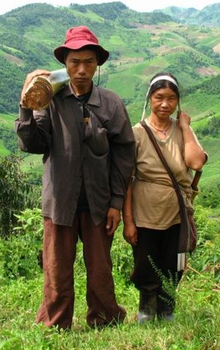 AnAge entry for Homo sapiens
AnAge entry for Homo sapiens
Classification (HAGRID: 02424)
- Taxonomy
-
Kingdom: Animalia
Phylum: Chordata
Class: Mammalia (Taxon entry)
Order: Primates (Taxon entry)
Family: Hominidae
Genus: Homo
- Species
- Homo sapiens
- Common name
- Human
- Synonyms
- Homo aethiopicus, Homo americanus, Homo arabicus, Homo australasicus, Homo cafer, Homo capensis, Homo columbicus, Homo drennani, Homo grimaldii, Homo hottentotus, Homo hyperboreus, Homo indicus, Homo japeticus, Homo melaninus, Homo monstrosus, Homo neptunianus, Homo palestinus, Homo patagonus, Homo priscus, Homo scythicus, Homo sinicus, Homo spelaeus, Homo troglodytes, Homo wadjakensis, Homo sapiens cro-magnonensis, Homo sapiens grimaldiensis, Homo fossilis proto-aethiopicus, Homo fossilis protoaethiopicus, Homo sapiens cromagnonensis
Lifespan, ageing, and relevant traits
- IMR
- 0.0002/year
- MRDT
- 8 years
- Maximum longevity
- 122.5 years (captivity)
- Source
- ref. 29
- Sample size
- Huge
- Data quality
- High
- Observations
Succinctly, we humans age gradually and exhibit reproductive senescence. Although women tend to outlive men and there are gender differences in age-related pathologies, overall there are probably no differences between the sexes in terms of rate of ageing. Likewise, populations in different environments do not appear to greatly differ in rate of ageing even though they can differ on specific age-related diseases. The human mortality rate begin to increase exponentially after about age 30, doubling roughly every 8 years. The body's functional decline, however, starts after the sexual peak, roughly at age 19, and perhaps some functions decline even earlier in life [0014]. A peculiar phenomena, though not unique of humans, is that the MRDT increases after about age 65. This has been suggested to be a statistical effect rather than any unknown biological process [0031]. Numerous physiological, endocrine, cellular and molecular changes have been observed with age in humans [0975]. Cardiovascular diseases are the major cause of death in modern societies, followed by several types of cancer; the increase in lifespan is also leading to an increase in the incidence of neurodegenerative conditions such as Alzheimer's disease [0981].
French woman Jeanne Calment is recorded as the longest-lived human being and was over 122 years of age when she died in 1997 [0029]. Compared to other species, of course, the maximum longevity of humans is based on a considerably larger sample. Therefore, it has been argued that, for comparative purposes, it is more adequate to use as human maximum longevity 90 or 100 years [0715].
The average human life expectancy worldwide is 66 years, ranging from 39 years in Zambia to 82 years in Japan. Among hunter-gatherers, the average life expectancy was probably around 30 years [0841].
Life history traits (averages)
- No information is available on life history. Please contact us if you wish to suggest or contribute data.
Metabolism
- Typical body temperature
- 310ºK or 37.0ºC or 98.6ºF
- Basal metabolic rate
- 82.7800 W
- Body mass
- 70000.0 g
- Metabolic rate per body mass
- 0.001183 W/g
Species in other databases
References
- [1242] Marck et al. (2017), Age-Related Changes in Locomotor Performance Reveal a Similar Pattern for Caenorhabditis elegans, Mus domesticus, Canis familiaris, Equus caballus, and Homo sapiens (PubMed)
- [1274] Colchero et al. (2016), The emergence of longevous populations (PubMed)
- [1150] Jones et al. (2014), Diversity of ageing across the tree of life (PubMed)
- [1123] Blevins et al. (2013), Brief communication: Adrenal androgens and aging: Female chimpanzees (Pan troglodytes) compared with women (PubMed)
- [1122] Chen et al. (2013), Brain aging in humans, chimpanzees (Pan troglodytes), and rhesus macaques (Macaca mulatta): magnetic resonance imaging studies of macro- and microstructural changes (PubMed)
- [1103] Lazic (2012), Modeling hippocampal neurogenesis across the lifespan in seven species (PubMed)
- [0899] Sherwood et al. (2011), Aging of the cerebral cortex differs between humans and chimpanzees (PubMed)
- [1136] Gomes et al. (2011), Comparative biology of mammalian telomeres: hypotheses on ancestral states and the roles of telomeres in longevity determination (PubMed)
- [0981] Wolf and Austad (2010), Introduction: Lifespans and Pathologies Present at Death in Laboratory Animals
- [1078] Hawkes et al. (2009), Mortality and fertility rates in humans and chimpanzees: How within-species variation complicates cross-species comparisons (PubMed)
- [0798] Gardner et al. (2007), Telomere dynamics in macaques and humans (PubMed)
- [0841] Gurven and Kaplan (2007), Longevity among hunter-gatherers: a cross-cultural examination
- [0607] Dou et al. (2006), Co-evolutionary analysis of insulin/insulin like growth factor 1 signal pathway in vertebrate species (PubMed)
- [0742] Miller and Austad (2006), Growth and aging: why do big dogs die young?
- [0715] Lorenzini et al. (2005), Cellular replicative capacity correlates primarily with species body mass not longevity (PubMed)
- [0976] Cohen (2004), Female post-reproductive lifespan: a general mammalian trait (PubMed)
- [0465] Corr (2004), Nuns and monkeys: investigating the behavior of our oldest old (PubMed)
- [0256] Finch and Stanford (2004), Meat-adaptive genes and the evolution of slower aging in humans (PubMed)
- [0331] Fukumoto et al. (2004), Beta-secretase activity increases with aging in human, monkey, and mouse brain (PubMed)
- [0036] Savage et al. (2004), The predominance of quarter-power scaling in biology
- [0253] Crews and Gerber (2003), Reconstructing life history of hominids and humans (PubMed)
- [0255] de Magalhaes (2003), Is mammalian aging genetically controlled? (PubMed)
- [0254] Kaplan and Robson (2002), The emergence of humans: the coevolution of intelligence and longevity with intergenerational transfers (PubMed)
- [0467] Lindenfors (2002), Sexually antagonistic selection on primate size
- [0217] Ogburn et al. (2001), Exceptional cellular resistance to oxidative damage in long-lived birds requires active gene expression (PubMed)
- [0031] Rossolini and Piantanelli (2001), Mathematical modeling of the aging processes and the mechanisms of mortality: paramount role of heterogeneity (PubMed)
- [0189] Kapahi et al. (1999), Positive correlation between mammalian life span and cellular resistance to stress (PubMed)
- [0434] Ronald Nowak (1999), Walker's Mammals of the World
- [0030] Vaupel et al. (1998), Biodemographic trajectories of longevity (PubMed)
- [0029] Michel Allard (1998), Jeanne Calment: From Van Goghs time to ours: 122 extraordinary years
- [0076] Tekirian et al. (1996), Carboxy terminal of beta-amyloid deposits in aged human, canine, and polar bear brains (PubMed)
- [0405] Holmes and Austad (1995), Birds as animal models for the comparative biology of aging: a prospectus (PubMed)
- [0125] Tracy and Johnson (1994), Aging of a class of arteries in various mammalian species in relation to the life span (PubMed)
- [0014] Leonard Hayflick (1994), How and Why We Age
- [0455] Virginia Hayssen et al. (1993), Asdell's Patterns of Mammalian Reproduction: A Compendium of Species-Specific Data
- [0058] Finch et al. (1990), Slow mortality rate accelerations during aging in some animals approximate that of humans (PubMed)
- [0002] Caleb Finch (1990), Longevity, Senescence, and the Genome
- [0111] Woodruff-Pak (1988), Aging and classical conditioning: parallel studies in rabbits and humans (PubMed)
- [0075] Selkoe et al. (1987), Conservation of brain amyloid proteins in aged mammals and humans with Alzheimer's disease (PubMed)
- [0110] Lippman (1985), Rapid in vivo quantification and comparison of hydroperoxides and oxidized collagen in aging mice, rabbits and man (PubMed)
- [0325] Passingham (1985), Rates of brain development in mammals including man (PubMed)
- [0731] Zullinger et al. (1984), Fitting sigmoid equations to mammalian growth curves
- [0134] Rohme (1981), Evidence for a relationship between longevity of mammalian species and life spans of normal fibroblasts in vitro and erythrocytes in vivo (PubMed)
- [0059] Tolmasoff et al. (1980), Superoxide dismutase: correlation with life-span and specific metabolic rate in primate species (PubMed)
- [0436] Cutler (1979), Evolution of human longevity: a critical overview (PubMed)
- [0013] Alex Comfort (1979), Ageing: The Biology of Senescence
- [0121] Deyl et al. (1971), Aging of the connective tissue: collagen cross linking in animals of different species and equal age (PubMed)
- [0065] The Human Mortality Database
- [0975] Digital Ageing Atlas
External Resources
- Integrated Taxonomic Information System
- ITIS 180092
- Animal Diversity Web
- ADW account
- Encyclopaedia of Life
- Search EOL
- NCBI Taxonomy
- Taxonomy ID 9606
- Entrez
- Search all databases
- Ageing Literature
- Search Google Scholar or Search PubMed
- Images
- Google Image search
- Internet
- Search Google

